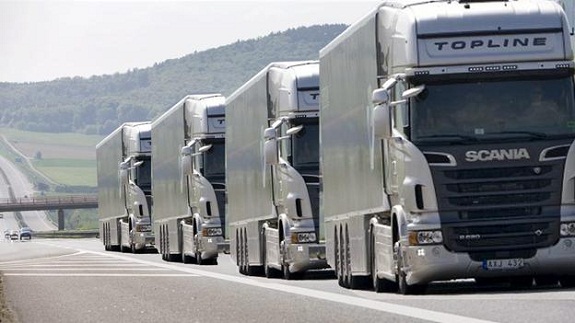Will Autonomous Trucks Take Place of Truck Drivers?
by Jana Ritter - Published: 1/09/2014Last year Volvo Trucks tried out its autonomous vehicles on public roads for the first time, as part of an experiment with a lead driver in a truck controlling the speed, steering and braking of two or more trucks or cars, to form a road train.

Now Amazon's delivery drones are making headlines and autonomous trucks could also be a reality in about 10 years if the law permits it. While some feel that autonomous trucks would help boost economic growth and cut shipping costs, it obviously wouldn’t make truck drivers too happy. But apparently the European Union is already making advanced emergency braking systems (AEBS) – which can take independent action to avoid accidents, and even, in some cases, prevent them – mandatory for all new trucks and coaches in 2018.
"Yes, we have done it," says Carl Johan Almquist, the traffic and product safety director for Volvo Trucks. "In May 2012, the two trucks and three cars that were involved in Project Sartre took part in a road train that covered 124 miles in one day in Spain. Although driving at 56mph and only 5m apart, is rather scary." The success of Project Sartre showed, he believes, that the hardware is already in place for the next level. "It is really exciting," he says, because when the lead driver brakes, the other vehicles brake "instantly". By allowing trucks to drive as close as 5m to each other, many more vehicles can be fitted on to the same road, and both congestion and fuel consumption are reduced.
But to many, this already poses a major safety concern and raises the question whether technology can be 100 per cent reliable. While many in the industry believe that machines should eventually become better drivers than humans, it might take a while to prove the case to governments and the public. For some truck drivers, the whole concept is just plain nonsense. "People come up with these grandiose ideas," says Bob Esler of Taylor, Mich., who has been driving a truck since 1968. "How are you going to get the truck into a dock or fuel it?"
There is also question as to how much will be saved when the real costs are hard to peg. Most experts on autonomous vehicles say that at least initially, the robot trucks will have to run on roads separate from regular vehicles, or via embedded roadside beacons. That won't be cheap, nor will overhauling the trucking industry to function with an automated system.
There are many reasons to point out both for and against any changes brought on by technology, but usually it’s simply an inevitable thing. In this case, perhaps the best way to look at it is not that autonomous trucks will replace truck drivers but simply change the nature of the job. Whether it will require more computer skills or soft sales skills (and less driving), today’s teamsters could be tomorrow’s engineers or even concierges
